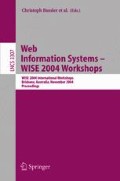Abstract
Virtual learning environments can be greatly improved if they can provide location independent services and personalized interactions to the learning community. One way of achieving this is by having smart virtual counterparts to represent the users in the virtual learning environment. We propose that mobile agent technology is aptly suited for providing such smart virtual counterparts to represent learners, teachers and institutions in the virtual learning community.
Access this chapter
Tax calculation will be finalised at checkout
Purchases are for personal use only
Preview
Unable to display preview. Download preview PDF.
References
Barajas, M., Owen, M.: Implementing Virtual Learning Environments: Looking for Holistic Approach. Educational Technology & Society 3(3) (2000)
Dillenbourg, P.: Virtual Learning Environments. In: EUN Conference 2000: Workshop on Virtual Learning Environments (2000)
Bouras, C., Philopoulos, A., Tsiatox, T.: A Neworked Intelligent Distributed Virtual Training Environment: A First Approach. In: 5th Joint Conference on Information Sciences-JCIS 2000-1st International Workshop on Intelligent Multimedia Computing and Networking, Taj Mahal, Atlantic City, New Jersey, USA, vol. 2, pp. 604–607 (2000)
Zakaria, A., Siraj, F., Ahdon, M.F., Hussin, M., Zaidil Adha, M.: PEAGENT: An Interactive Web-Based Educational System Using Animated Pedagogical Agent. In: Proceedings of International Conference on Artificial Intelligence Application in Engineering and Information Technology (ICAIET 2002), Hotel Sutera Magellan, Kota Kinabalu, Sabah, June 17-18 (2002)
Weiβ, G.: Agent Orientation in Software Engineering. Knowledge Engineering Review 16(4), 349–373 (2002)
Gray, R., Kotz, D., Nog, S., Rus, D., Cybenko, G.: Mobile agents: the next generation in distributed computing. In: Proceedings of the Second Aizu International Symposium on Parallel Algorithms/Architecture Synthesis, pp. 8–24 (1997)
Hong, H., Kinshuk: Mobile Agents in Adaptive Learning Systems. In: The Proceedings of the IEEE International Workshop on Wireless and Mobile Technologies in Education, WMTE 2002 (2002)
De Berardina, C., Pizzutilo, S.: A MultiAgent Infrastructure supporting Personalized Interaction with Smart Environments. In: Proceedings of Workshop on Ubiquitous Agents on embedded, wearable, and mobile devices held in conjunction with the 2002 Conference on Autonomous Agents & Multiagent Systems, AAMAS 2002 (2002)
Kindberg, T., et al.: People, Places, Things: Web Presence for the Real World. In: The 3rd IEEE Workshop on Mobile Computing Systems and Applications, December 7-8, pp. 19–28 (2000)
Romer, K., Schoch, T., Mattern, F., Dubendorfer, T.D.: Smart identification frameworks for ubiquitous computing applications. In: Proceedings of the 1st IEEE International Conference on Pervasive Computing and Communications (PerCom 2003), March 23-26, pp. 253–262 (2003)
Fox, B., Johanson, P.H., Winograd, T.: Integrating Information Appliances into an Interactive Workspace. IEEE Computer Graphics & Applications, 20 (3) (May/June 2000)
Kidd, C.D., Orr, R., Abowd, G.D., Atkeson, C.G., Essa, I.A., MacIntyre, B., Mynatt, E., Starner, T.E., Newstetter, W.: The Aware Home: A Living Laboratory for Ubiquitous Computing Research. In: The Proceedings of the Second International Workshop on Cooperative Buildings – CoBuild 1999 (1999)
Grasshopper 2 – The Agent Platform at, http://www.grasshopper.de/
OMG (1995), Common Facilities RFP3, Request for Proposal OMG TC Document 95-11- 3 (November 1995) MASIF specification is available through, http://www.omg.org/ , http://www.omg.org/
Saha, D., Mukherjee, A.: Pervasive Computing: a paradigm for the 21st century. Computer 36(3), 25–31 (2003)
Mavrommati, I.: Situatied Interaction in an educational setting: Position paper in on 11th, http://www.teco.edu/chi2000ws/papers/25_mavrommati.pdf accessed (February 2004)
Hong, H., Kinshuk, H.X., Patel, A., Jesshope, C.: Application of Mobile agents in Webbased Learning environment. In: Montgomerie, C., Viteli, J. (eds.) Proceedings of Ed-Media 2001, Tampere, Finland, AACE, Vancouver (2001) ISBN 1-880094-42-8
Perez, P., Mendez, G., de Antonio, A.: mIVA: Why to Use Mobile Agents in Virtual Environments and Wireless Devices. In: ECAI 2002, 15th European Conference on Artificial Intelligence. Workshop W6, Artificial Intelligence in Mobile System, Lyon, France (July 2002)
Author information
Authors and Affiliations
Editor information
Editors and Affiliations
Rights and permissions
Copyright information
© 2004 Springer-Verlag Berlin Heidelberg
About this paper
Cite this paper
Chhetri, M.B., Krishnaswamy, S., Loke, S.W. (2004). Smart Virtual Counterparts for Learning Communities. In: Bussler, C., et al. Web Information Systems – WISE 2004 Workshops. WISE 2004. Lecture Notes in Computer Science, vol 3307. Springer, Berlin, Heidelberg. https://doi.org/10.1007/978-3-540-30481-4_12
Download citation
DOI: https://doi.org/10.1007/978-3-540-30481-4_12
Publisher Name: Springer, Berlin, Heidelberg
Print ISBN: 978-3-540-23892-8
Online ISBN: 978-3-540-30481-4
eBook Packages: Springer Book Archive

